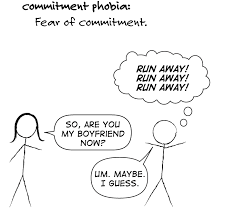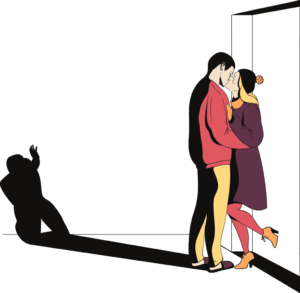Do you find yourself backing away from relationships or opportunities just when things are getting serious? If so, you may be struggling with fear of commitment. This debilitating condition (being scared of commitment) can affect all areas of your life.
It can span from your relationships to your professional achievements. In this article, we will explore the causes behind the fear of commitment, the risks associated with it, and ways to overcome it.
Contents
Understanding Fear of Commitment

Fear of commitment is a term used to describe a range of psychological issues that lead people to avoid committing to relationships or opportunities. People with this fear may feel anxious and overwhelmed at the thought of committing.
They may worry about the potential risks and consequences associated with taking a step forward. This can lead them to hesitate or back away from commitments, even when they want to take them.
Fear of Commitment Vs. Commitment Phobia
Fear of commitment is different from commitment phobia. Commitment phobia is a specific type of fear of commitment that is diagnosed by a mental health professional. People with this condition have an irrational and excessive fear of marriage or any other serious committed relationship.
Types of Fear of Commitment
Fear of commitment can manifest in different ways. Some people may avoid any serious commitment, while others may only fear specific types of commitments (e.g., marriage).
The intensity of the fear can also vary from person to person. There are several different types of fear of commitment. They can be broadly classified into three categories:
- Fear of intimacy: Avoiding forming intimate relationships or letting others in emotionally.
- Fear of marriage: Avoiding commitment to a serious relationship or having an irrational fear of getting married.
- Relationship anxiety: Having feelings of distress, unease, and worry about your relationship that is out of proportion to the actual issue at hand.
- Fear of parenthood: Feeling anxious about becoming a parent even though you want children and the prospect does not seem overwhelming for most people.
- Fear of work: Avoid taking on responsibilities at work and feeling anxious about accepting new opportunities. In some cases, this can lead to a person becoming unemployed.
NOTE: The fear of commitment can also occur in a generalized form, where you have mild symptoms in all areas and severe symptoms in one particular area.
Reasons Behind Fear of Commitment
There is no one-size-fits-all answer to this question. Each person’s fear of commitment may have its own unique set of causes. However, there are some common reasons behind the fear of commitment. These include:
Lack of trust: People who have difficulty trusting others may be scared to commit to a relationship. This is because they fear that their partner will eventually hurt them or leave them. They may also worry about giving up too much control or independence in a relationship.
Perfectionism: People with a perfectionist personality type may be afraid to commit to a relationship or an opportunity. Because they feel like they will never be good enough. They may worry that if they make a mistake. So, they will ruin everything. They may also be afraid of the amount of responsibility that comes with a committed relationship.
Fear of the unknown: People who are scared of change may be afraid to commit to a new relationship or opportunity. They may feel like they are taking a risk by entering into something new and uncertain. They may worry that the new situation will not meet their expectations. Or that it will not be as good as they think it is.
Risk Factors of Fear of Commitment
Some risk factors can increase your chances of developing a fear of commitment. These include:
Having a history of being hurt in previous relationships: People who have been hurt or disappointed in past relationships may be more likely to develop a fear of commitment. This may be because they are afraid of getting hurt again or because they associate commitment with pain and loss.
Having low self-esteem: People who have low self-esteem may be more likely to develop a fear of commitment. This is because they do not feel worthy of taking on new responsibilities or forming a serious relationship. They may also worry that they will not be good enough for their partner.
Having anxiety or depression: People who suffer from anxiety or depression may be more likely to develop a fear of commitment. This is because these conditions can cause feelings of distress and hopelessness. People with anxiety or depression may feel like it is not worth getting involved in a new relationship, as it will only end in pain.
Personality Types Prone To Fear of Commitment
Certain personality types may be more prone to developing a fear of commitment. These include:
The dependent personality type: People with a dependent personality type often have a fear of being alone. They may feel like they need someone else to complete them and may be afraid of being left by their partner.
The anxious personality type: People with an anxious personality type often have difficulty forming relationships due to feelings of insecurity and distrust. They may worry that they will not be good enough for a person or that the other person will eventually leave them.
The avoidant personality type: People with an avoidant personality type often have a fear of intimacy and tend to shy away from relationships. They may be afraid of getting close to someone because they fear that their partner will only end up leaving them.
Living With Fear Commitment

A fear of commitment can have a significant impact on your personal life. It can cause you to avoid getting involved in any serious relationships and can limit your opportunities. It can also make you feel anxious and stressed, which can lead to problems such as insomnia or depression.
Its Impact On Marriage
A fear of commitment can also harm a marriage. People who are scared of commitment may be less likely to get married and may be more likely to get divorced. They may also be less likely to stay in a bad relationship, as they are afraid of committing to something that is not right for them.
Its Impact On Parenthood
People who are scared of commitment may also be hesitant to have children. This is because they fear the responsibility that comes with parenting and do not want to commit themselves to take care of a child. They may also worry that they will not be good parents or that their children will end up being hurt by them.
Its Impact On Worklife
A fear of commitment can also have an impact on your work-life. People who are scared of commitment may be less likely to take on new job opportunities or promotions. They may also be less likely to stay in a job for a long period. This is because they do not want to commit themselves to something that may not be right for them.
Its Impact On Social Life
A fear of commitment can also have an impact on your social life. People who are scared of commitment may be less likely to go out and socialize with friends. They may also be less likely to join groups or clubs. This is because they do not want to commit themselves to something that will take up their time.
Its Impact On Your Growth
A fear of commitment can also harm your personal growth. People who are scared of commitment may be less likely to try new things or to take risks. This is because they are afraid of making a mistake and of committing themselves to something that may not work out.
Coping With Fear of Commitment
There are also several self-help tips that you can use to help cope with your fear of commitment. These include:
Taking things slow: When you are first getting involved in a relationship, take things slow and do not rush into anything. This will help reduce the pressure and stress that is often associated with committing to someone.
Establishing boundaries: Establish clear boundaries with the people that you are involved with. This will help you to avoid feeling overwhelmed or smothered by them.
Putting your needs first: Make sure that you put your own needs first and do not let anyone else control or dictate what you do. This will help you maintain your independence and autonomy.
Using positive self-talk: Positively talk to yourself and be kind to yourself. This will help you feel more confident and secure in your relationships.
Other Wayforwards
If you are struggling with a fear of commitment, there are steps that you can take to help cope with it. These include:
Talking to friends and family: You may also want to consider talking to a friend or family member about your fear of commitment. They can provide you with support and advice that will help you cope with this fear. They may also be able to offer additional resources such as books, articles, videos, etc., which can help you cope with this fear.
Talking to a therapist: You may want to consider talking to a professional counselor or therapist about your fear of commitment. A trained mental health professional can give you the tools and skills that you need to overcome this fear. They may also be able to help you work through other issues such as low self-esteem, depression, and anxiety which may be contributing to your fear of commitment.
Talking To a Professional
If you want to talk to someone about your fear of commitment, there are several professionals that you can turn to. These include:
- Doctors: Doctors can help you rule out any physical causes for your fear of commitment. They will also be able to give you advice on how to cope with this fear and where you can go if you need further assistance in overcoming it.
- Attorneys: Attorneys can provide legal advice on what steps to take if you are considering getting married or entering into a serious relationship. They may also be able to provide additional resources such as books, articles, videos, etc., that can help you cope with this fear of commitment.
- Mental health professionals: Therapists and counselors can help you work through the issues that may be causing your fear of commitment and give you tools for coping with it. They can also help you gain insight into yourself and your relationships so that you understand why you are scared of commitment and what needs to be done to overcome it.
How Can It Help
Talking to a professional about your fear of commitment can be helpful in several ways. It can help you:
Get support and advice: A professional will be able to provide you with support and advice on how to overcome your fear of commitment.
Understand the cause of your fear: A mental health professional will be able to help you understand the root cause of your fear of commitment. This can often help reduce the power that this fear has over you.
Gain insight into yourself: Talking to a therapist can also help you gain insight into yourself and your relationships. This can often help you understand why you are scared of commitment and what you need to do to overcome this fear.
Therapy Options

If you want to talk to a professional about your fear of commitment, several different therapy options are available to you. These include:
Exposure therapy: This type of therapy is designed to help you face your fears so that you can learn how to cope with them more effectively in the future.
Cognitive-behavioral therapy (CBT): This type of therapy is designed to help you change the way that you think and behave to overcome your fear of commitment.
Meditation and mindfulness: These types of therapies are designed to help you focus on the present moment rather than worrying about things that may or may not happen in the future. This can help you to feel more relaxed and at ease around relationships.
Couple’s therapy: This type of therapy is to help couples who are struggling with a fear of commitment. It can help them understand why they are scared of commitment and how they can work through these issues to have healthy, happy relationships.
Group therapy: Group therapy is a type of therapy that takes place in a group setting. It is to help people who are struggling with similar issues. Group therapy can be helpful for those who have fear of commitment. Because it can provide you with support and understanding from others who are also dealing with this fear.
NOTE: No matter what type of therapist you decide to see, it’s important that you find one that is right for you.
Hearing From Experts On Fear of Commitment
Several experts have written about the fear of commitment. Some of these experts include:
Dr. John Gottman: Dr. Gottman is a marriage and family therapist who has written extensively about relationships and how to make them work. He has also written about the importance of commitment in relationships.
Dr. Helen Fisher: Dr. Fisher is a biological anthropologist who has studied love and marriage extensively. She has written about the biology of romance and how it affects our relationships with others.
Dr. Aaron Beck: Dr. Beck is a cognitive therapist who has written about the role that thoughts play in our emotions and behavior. He has also written about how to change the way you think to overcome your fear of commitment.
Case Study

A Young Woman With Severe Fear Of Commitment
A young woman has had a history of being afraid to get into serious relationships, even though she is interested in meeting someone special. She always seems to find an excuse for why she can’t commit to a relationship, such as saying that she is too busy or that she just isn’t ready. When she is asked about her fear of commitment, she says that she is afraid of getting hurt and being left alone. She also worries that she won’t be able to handle the stress of a serious relationship.
When asked about her past relationships, she says that they all ended prematurely. She often felt like she was putting more effort into the relationship than her partner was and that eventually led to her feeling overwhelmed and stressed. She also recalls a time when she was in a long-term relationship and became very attached to her partner. When he broke up with her, she hit her lowdown and had a hard time recovering from the loss.
When asked about her views on love, she says that it is important to find someone who will be there for you through thick and thin. She wants to have children eventually but doesn’t feel like she can do it alone. She also thinks that relationships take a lot of effort and she worries that if she doesn’t put in enough effort her partner will leave her.
The Key Takeaway
When asked about how she would like things to change, she says that she wants to be able to enjoy life without constantly worrying about what might happen next. She also hopes to find someone who will love and accept her for who she is, even if that means she will have to work harder than her partner to maintain the relationship.
Movies And Books
There are several movies and books about people with commitment issues, some of which you can watch or read on your own time. Some examples include:
Movie
As Good As It Gets (1997): This movie is about a writer (in the act by Jack Nicholson) who is struggling with obsessive-compulsive disorder. He struggles to have relationships due to his condition and eventually meets a single mother (Helen Hunt) who helps him to overcome his fears so that he can learn how to cope with them more effectively in the future.
Book
The Mindful Way Through Depression (2007): This book is about a group of researchers who studied the effects of mindfulness-based cognitive therapy on people with depression. The results of their study showed that this type of therapy was effective in helping people to overcome their fears and negative thoughts about commitment.
Game
Getting Over It With Bennett Foddy (2017): This game is about a man by the name of Bennett Foddy who is trying to overcome his fear of heights. He tries many different ways to get over this phobia but none of them seem to work, so he decides that the only way for him to truly conquer this fear is by jumping off an extremely tall building. It’s funny because there are some elements of realism in this game such as the fact that you can die if you fall too far or hit your head on something sharp.
Conclusion
If you are struggling with a fear of commitment, it is important to seek help from a therapist or counselor. There are also many self-help books and articles available online that can help address this issue. Remember that everyone is different and there is no single solution that will work for everyone. Be patient and keep trying until you find the right approach for you!
A Word From Therapy Mantra
Your mental health — Your psychological, emotional, and social well-being — has an impact on every aspect of your life. Positive mental health essentially allows you to effectively deal with life’s everyday challenges.
At TherapyMantra, we have a team of therapists who provide affordable online therapy to assist you with issues such as depression, anxiety, stress, workplace Issues, addiction, relationship, OCD, LGBTQ, and PTSD. You can book a free therapy or download our free Android or iOS app.


